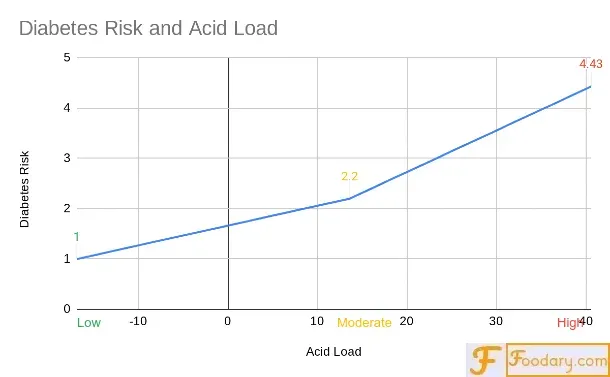Review: Examining dietary acid load in individuals with type 2 diabetes: a case-control study by Ozturk, E.E., H Yildiz
Examining dietary acid load in individuals with type 2 diabetes: a case-control study by Ozturk, E.E., H Yildiz
This is a summary of:
Ozturk, E.E. and Yildiz, H., 2023. Examining dietary acid load in individuals with type 2 diabetes: a case-control study. European Review for Medical & Pharmacological Sciences, 27(6).
@keithtaylor created this image using data from the study.
Diabetes and Acid Load Purpose
The purpose of this review is to inform people about high risks of diabetes from high dietary acid load. So that you can raise health concerns with your professional carers. By making your team aware of relevant research. It must not be used as a substitute for professional health care.
Be sure to consult a doctor or other qualified health professional:
About diabetes or any other health concern
Before radically changing your diet
Then, if you want help with further personal research, contact Foodary using the links below.
Diabetes and Acid Load Introduction
In the introduction, the authors point out several facts about diabetes. In particular:
Diabetes is a significant financial burden for healthcare.
Identifying risk factors helps manage diagnosis of diabetes.
Developing new treatments for diabetes is challenging.
Healthy diet, combined with medical treatment, is critical.
Typical Western Diet produces a high acid load that disrupts insulin pathways and other metabolic processes. Affecting obesity, kidney disease, high blood pressure, abnormal lipid profiles, bone health, migraine, sleep quality and mental health.
There are no recommendations for dietary acid load for diabetic people.
So the authors developed this case-control study. Aiming to evaluate dietary acid load against the risk of type 2 diabetes in Turkish people.
Diabetes and Acid Load Analysis
As you would expect from professional research, this study includes many layers of analysis to ensure that the conclusions are valid. But detailed statistical and medical analysis is mostly dependent on the unique history and status of individuals. Which is why I insist that you review the details with appropriate professionals.
However, the results that are significant for everyone include the analysis of diabetic risk when comparing three ranges of dietary acid load. So I used that data to produce the Diabetes Risk and Acid Load Chart featured above.
The study uses Potential Renal Acid Load (PRAL) calculations to analyze study participants into what they call tertiles. And though the term isn't used in the strictly correct statistical sense, the study can compare diabetes risk across three groups that I've labeled Low, Moderate, and High Acid Load.
People with PRAL scores in the third tertile are approximately four times more likely to have type 2 diabetes than people with scores in the lowest tertile
| Acid Load | PRAL | Diabetes Risk |
|---|---|---|
| Low | -16.88 | 1 |
| Moderate | 13.6 | 2.2 |
| High | 40.59 | 4.43 |
Diabetes and Acid Load Conclusion
In conclusion, the findings of the current study suggested that an increase in the acid load of the diet would be associated with an increased risk of type 2 diabetes among Turkish people. This study indicates that improved balance may be an effective intervention strategy for preventing type 2 diabetes. It should be noted that this is only an observational study, and there is a need for interventional studies to assess whether changes in dietary acid load have an effect on the risk of type 2 diabetes
Your Diabetes and Acid Load
Your diabetes
Help with your diabetes is beyond the scope of Foodary.
Your Acid Load
Foodary has more about the calculation of Potential Renal Acid Load. Also, PRAL food lists. And you can share your questions, experiences, and opinions about dietary acid load in comments below. Or in the Foodary Forum.
#waivio #waiv #diabetes #science #nutrition
⦅Foodary⦆ | ⦅Forum⦆ | ⦅Newsletter⦆ | ⦅Search⦆

!hbit
Success! You mined 1.0 HBIT on Wusang: Isle of Blaq. | tools | wallet | discord | community | daily <><

And, you found a BLAQ pearl (BLAQ)!
Check your bonus treasure tokens by entering your username at an H-E explorer or take a look at your wallet.
Read about Hivebits (HBIT) or read the story of Wusang: Isle of Blaq.